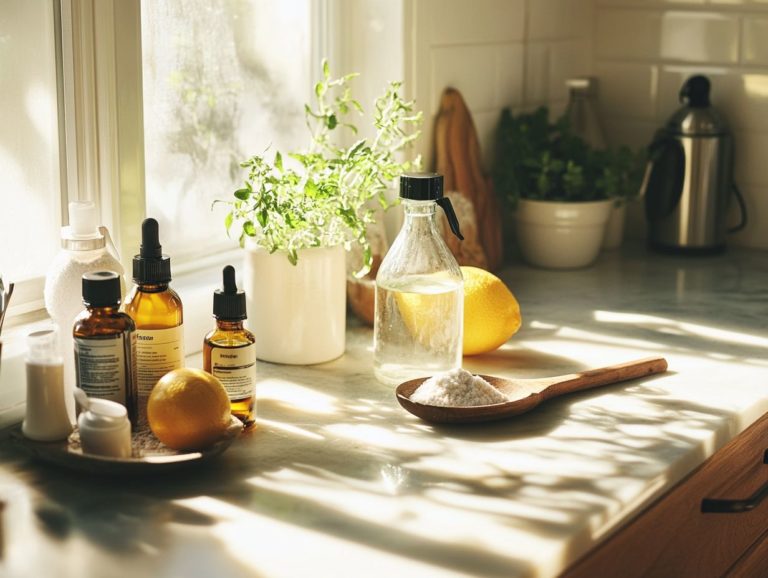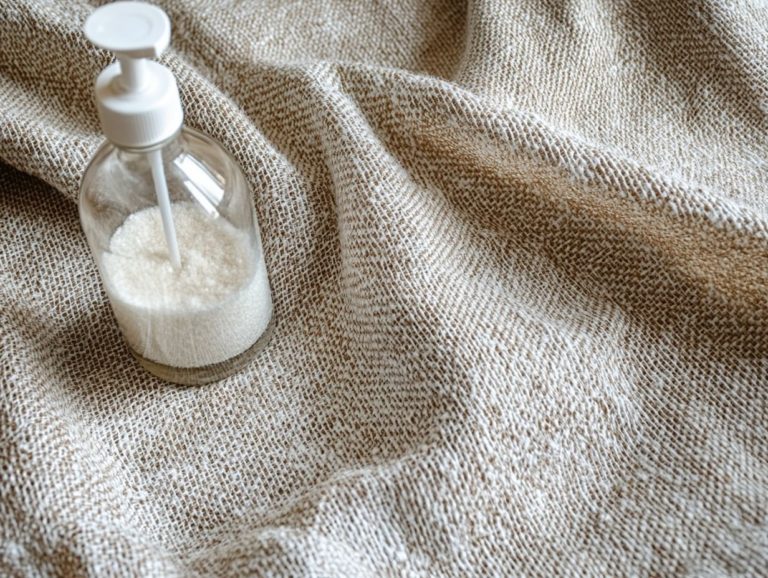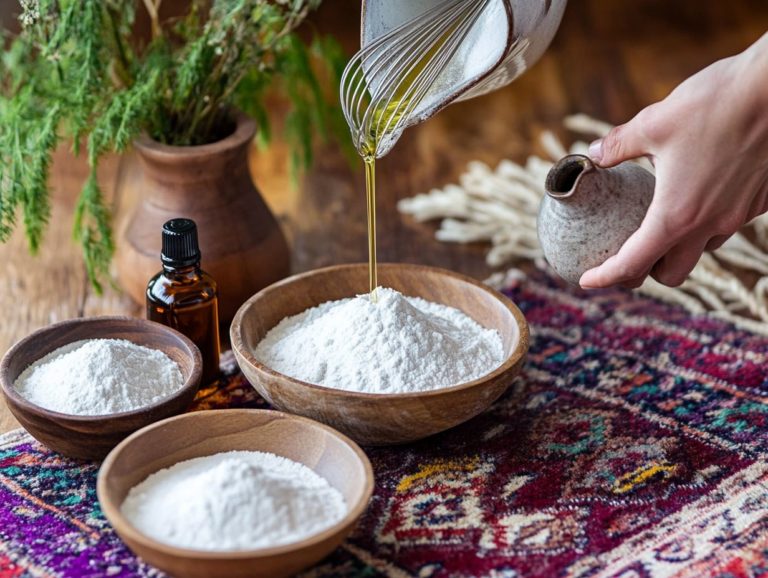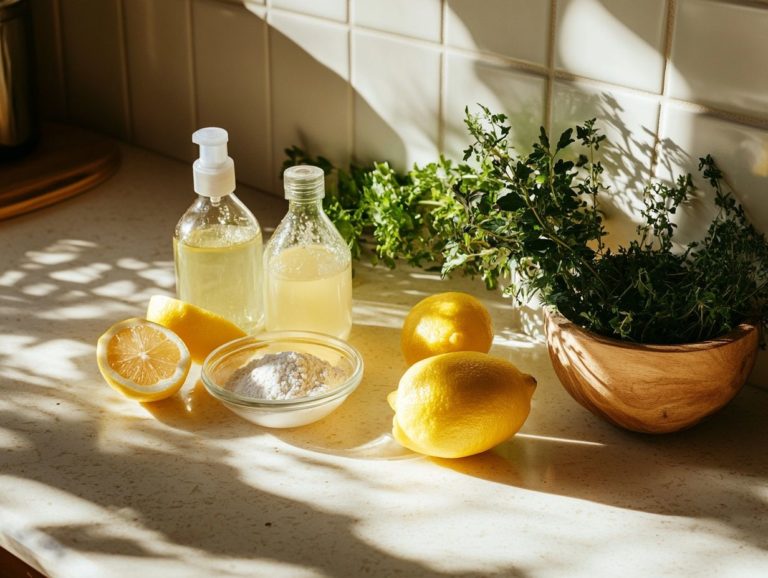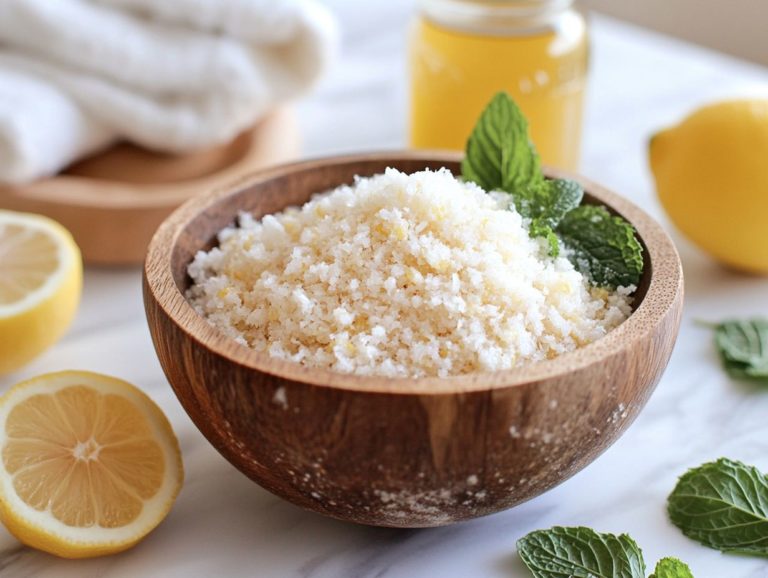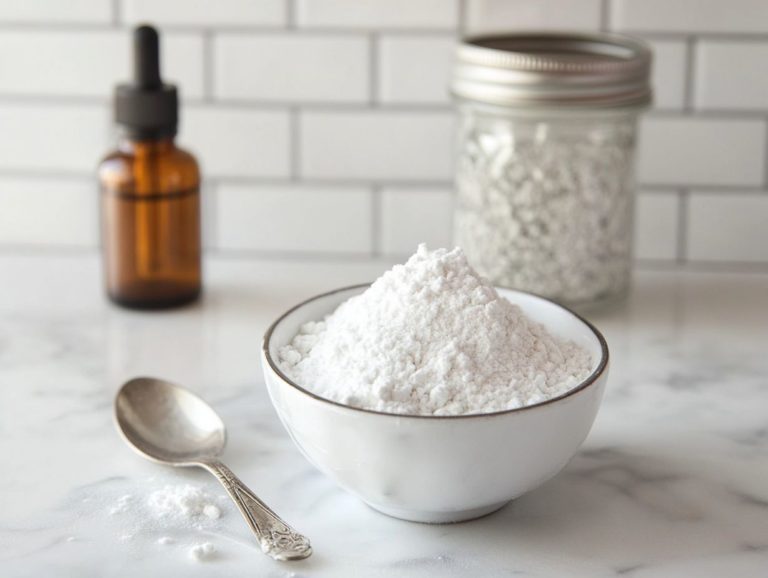How to Make a Safe Homemade Window Cleaner
Maintaining spotless windows doesn t have to depend on harsh chemicals or pricey store-bought cleaners. Instead, you can opt for homemade cleaning products that are both effective and safe for the environment.
You can whip up a simple, eco-friendly window cleaner that effectively banishes grime while keeping your family and pets safe. This basic homemade recipe requires common household items like distilled white vinegar and distilled water.
Discover the essential ingredients you’ll need, along with straightforward step-by-step instructions for crafting your cleaner. Plus, get insider tips for achieving that coveted streak-free shine!
Explore the various glass surfaces it works wonders on and learn how to personalize your cleaner with delightful scents using essential oils like lemon or lavender that elevate your cleaning routine.
Let s get started on making your own natural cleaning solution today!
Contents
- Key Takeaways:
- Why Use a Homemade Window Cleaner?
- What Ingredients Do You Need?
- How to Make the Window Cleaner?
- What Surfaces Can You Use it On?
- Safety Precautions for Using Homemade Cleaners
- Effective Tips for Using Homemade Cleaners
- Can You Add Scent to the Homemade Window Cleaner?
- What Are Some Other Natural Cleaning Solutions?
- Frequently Asked Questions
- What ingredients do I need to make a safe homemade window cleaner?
- Can I use any type of vinegar for my homemade window cleaner?
- How do I mix the ingredients for my homemade window cleaner recipe?
- Is it safe to use essential oils in my homemade window cleaner?
- Can I use my homemade window cleaner on all types of windows?
- How long does my homemade window cleaner last?
Key Takeaways:
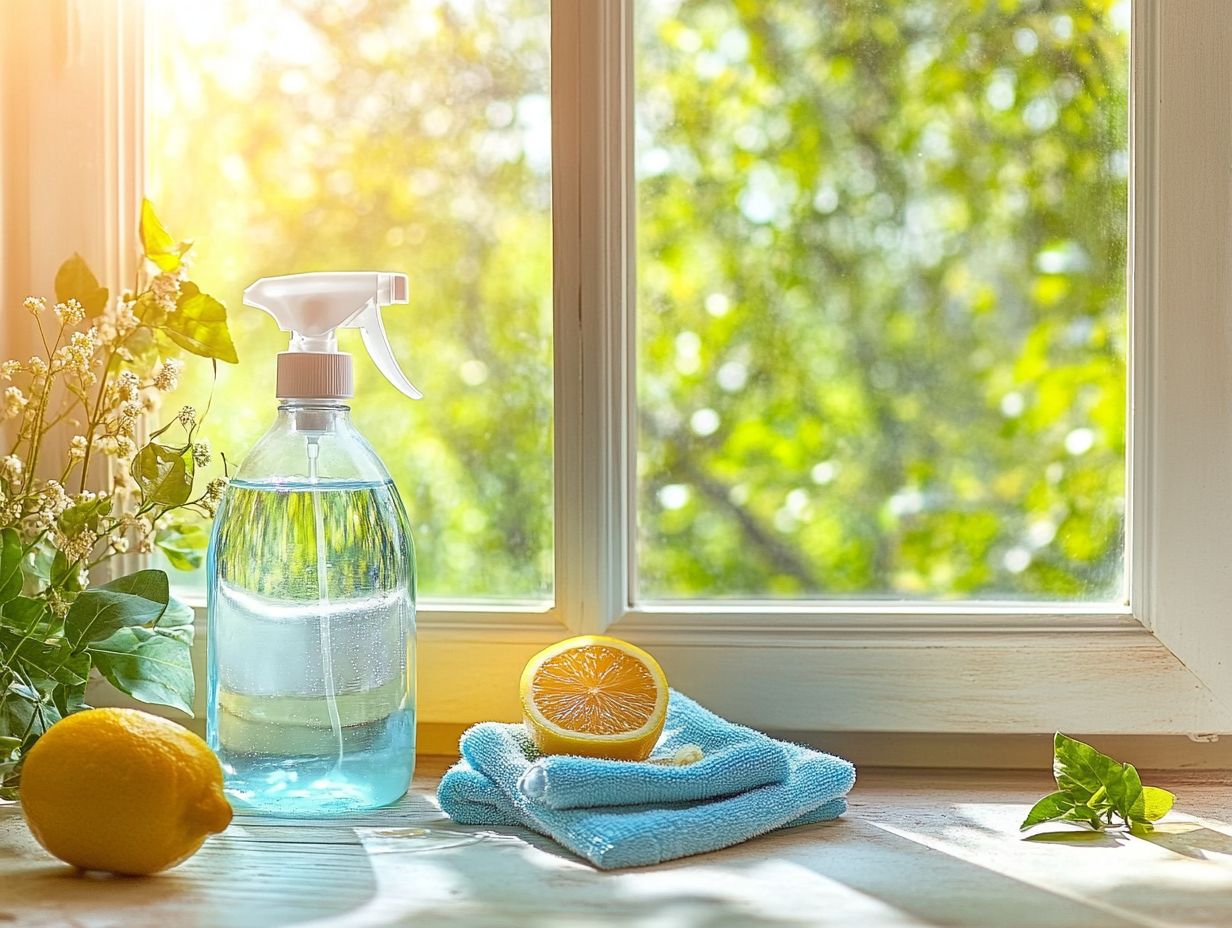
- Use a homemade window cleaner for a safe and effective cleaning solution.
- Mix distilled water, white vinegar, rubbing alcohol, and optional essential oils to make the homemade glass cleaner.
- Test on a small area, avoid contact with eyes, and keep out of reach of children and pets for safety.
Why Use a Homemade Window Cleaner?
Using a homemade window cleaner offers you a cost-effective and safe for the environment alternative to commercial cleaning products. This ensures a safe solution for your household, especially if you have kids and pets. It also serves as an effective all-purpose cleaner.
This DIY approach minimizes your exposure to harsh chemicals while allowing you to craft a cleaning solution tailored to your preferences using everyday items like vinegar, distilled water, and essential oils. You can also enhance it with natural ingredients like Castile soap, a gentle soap made from vegetable oils, and hydrogen peroxide for added versatility.
By choosing a homemade cleaner, you can achieve streak-free results on your glass surfaces and contribute to a greener planet. This avoids the harmful toxins often found in store-bought cleaners that can impact both your health and the environment. This safe alternative is also suitable for cleaning windows and mirrors, ensuring a brilliant shine every time.
What Ingredients Do You Need?
To craft an effective homemade window cleaner, you only need a handful of simple ingredients like distilled white vinegar and distilled water. These are easy to find and remarkably effective in achieving streak-free results on your glass surfaces.
The core components of this glass cleaner recipe consist of distilled water, white vinegar, rubbing alcohol, and, if desired, a few drops of essential oils to add a delightful scent. Some recipes also include Castile soap for enhanced cleaning power.
These ingredients harmonize to form a non-toxic cleaner that ensures your windows shine brilliantly without harmful chemicals, making it a safe choice for households with children and pets. Using a microfiber cloth or a squeegee can further enhance the cleaning process.
1. Distilled Water
Distilled water is essential for creating a DIY glass cleaner, as it is free of impurities and minerals that can leave unsightly streaks on your glass surfaces. Unlike tap water, which may harbor chemicals and sediments, distilled water guarantees that your homemade window cleaner provides optimal streak-free results.
This purity boosts the cleaning solution’s performance and aligns with a more health-conscious approach to household cleaning. When you use distilled water, you minimize the risk of chemical reactions with other cleaning agents, ensuring that every ingredient works together seamlessly for maximum effectiveness.
Choosing distilled water supports a non-toxic cleaning routine that is safe for both your family and the environment. It eliminates harmful additives and contaminants commonly found in commercial cleaners. By opting for distilled water, you re not just achieving windows that sparkle you re also championing a greener lifestyle.
2. White Vinegar
White vinegar is your secret weapon for homemade window cleaners. It has great cleaning ability and can slice through grime and grease on glass surfaces. This versatile, eco-friendly ingredient is a non-toxic marvel. It not only leaves your windows gleaming but also fights odors and disinfects surfaces. This makes it an essential component in many DIY cleaning concoctions.
But it doesn’t stop there. White vinegar breaks down mineral deposits and dirt effectively. This ensures that every inch of transparency is achieved without leaving behind harmful chemical residues. Its remarkable ability to neutralize unpleasant odors adds another layer of charm, creating a fresher atmosphere throughout your home.
With its ability to kill germs, it fosters a healthier living space, making it an ideal choice for those looking for effective yet safe cleaning solutions. By including white vinegar in your cleaning arsenal, you harness the power of nature to achieve a spotless home while protecting your environment.
3. Rubbing Alcohol
Rubbing alcohol is an essential ingredient in your quest for a flawless homemade window cleaner. It delivers streak-free results on glass surfaces, meaning your windows won t have marks after cleaning. It evaporates swiftly, leaving no residue behind. When you blend it with distilled water and vinegar, rubbing alcohol amplifies the cleaning power of your solution. This makes it your go-to choice for tackling tough spots and unsightly fingerprints on windows.
Its rapid evaporation rate means you won t be left waiting around; surfaces dry immediately, preventing the streaks that often bother common cleaning solutions. This is particularly advantageous for high-traffic areas where smudges seem to appear out of nowhere.
The solvent properties of rubbing alcohol allow it to cut through grease, grime, and dust with ease. It provides a deep clean that enhances the clarity of your glass. By incorporating rubbing alcohol into your cleaning mixture, you can achieve a sparkling finish that transforms your windows. It’s an essential ingredient for anyone in search of an efficient and reliable cleaning solution.
4. Essential Oils (Optional)
Imagine transforming your homemade glass cleaner with essential oils! These oils add a delightful fragrance that makes cleaning more enjoyable. While these oils aren’t strictly necessary for cleaning, popular choices like lemon or lavender offer pleasant scents and additional antibacterial benefits. This takes your DIY glass cleaner to an entirely new level.
Incorporating these natural essences boosts the sensory appeal and enhances the cleaner s effectiveness with their antimicrobial characteristics. If you seek a fresh, uplifting aroma, consider citrus oils like orange or grapefruit; they invigorate your cleaning routine, leaving surfaces sparkling and wonderfully fragrant.
Alternatively, a few drops of tea tree oil shine with their powerful ability to kill germs, making them an excellent option for achieving a deeper clean. By selecting the right essential oils, you can elevate a mundane chore into a delightful experience while ensuring your home remains both inviting and hygienic.
How to Make the Window Cleaner?
Creating a homemade window cleaner is easy and rewarding. You can blend a few essential ingredients into an effective cleaning solution customized to your liking.
The classic recipe usually includes distilled water, white vinegar, and rubbing alcohol. Mix these ingredients in a spray bottle for effortless application.
In just a few minutes and with minimal effort, you can craft a robust, non-toxic cleaner that delivers streak-free brilliance on all your glass surfaces. For optimal results, use cleaning tools like a squeegee or microfiber cloths.
Don’t wait try making your own window cleaner today for a sparkling home!
1. Mix the Ingredients
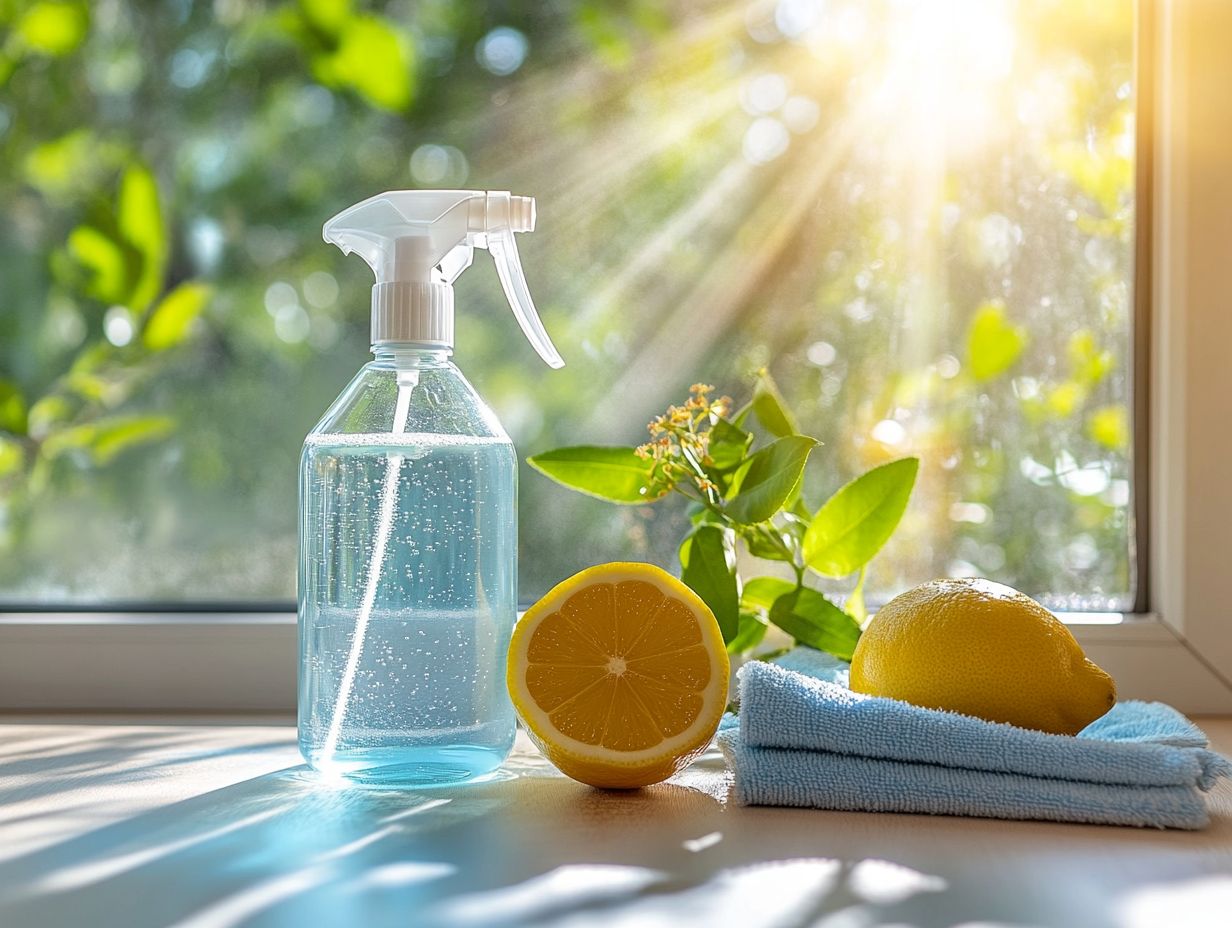
To create your own DIY glass cleaner, mix the ingredients to make a potent cleaning solution that can easily clean any glass surface. A classic recipe involves combining equal parts distilled water and white vinegar, along with a splash of rubbing alcohol to enhance the cleaning power and ensure streak-free results.
For roughly one quart of cleaner, mix one cup of distilled water with one cup of white vinegar, then add a quarter cup of rubbing alcohol. Make sure to stir or shake the mixture well for the best results!
Thorough mixing is crucial for achieving a uniform cleaning agent that effectively lifts dirt and grease from glass surfaces, leaving you with a brilliant shine and no residue.
2. Store in a Spray Bottle
Once you’ve mixed the ingredients, pour your homemade cleaner into a spray bottle for easy application on glass surfaces. This smart storage choice not only streamlines your cleaning routine but also keeps the solution fresh and ready for use whenever you need to clean windows or mirrors.
A spray bottle ensures even application, making quick work of any smudges or streaks. The portability factor is a game changer; you can easily carry it for quick cleaning sessions or move it from room to room without worrying about spills.
Label the bottle clearly with its contents and the preparation date. Store it in a cool, dark place to preserve its potency and extend its shelf life, ensuring it remains effective.
What Surfaces Can You Use it On?
A homemade window cleaner is a versatile gem that can be used on many glass surfaces, making it an essential addition to your cleaning arsenal. By using common household items like distilled white vinegar and distilled water, you can create an effective and safe cleaning solution.
It excels at cleaning windows, mirrors, and glass tables, delivering outstanding streak-free results that will leave your surfaces gleaming. For a pleasant scent, you can add a few drops of essential oil to your mixture.
By opting for this DIY cleaning solution, you can easily preserve the clarity and brilliance of your glass without relying on harsh commercial cleaners filled with harmful chemicals. This non-toxic cleaner is also a safe alternative for households with children and pets.
1. Cleaning Windows
Glass windows are one of the main surfaces for which homemade window cleaners are crafted, providing a safe and effective method for maintaining their clarity and shine. Using a non-toxic cleaner made from simple ingredients like vinegar and water ensures that your windows are cleaned without harmful chemicals an ideal choice for households with children and pets.
The cost-effectiveness of these DIY solutions is impressive, as they often rely on materials you likely have on hand, such as rubbing alcohol and Castile soap.
To achieve optimal results, wipe your windows with a microfiber cloth (a soft cloth made of tiny fibers that trap dirt and dust effectively) or newspaper, as these materials significantly reduce streaks and enhance shine. Using a squeegee can also help in achieving that spotless shine.
Cleaning during the cooler hours of the day is also smart; it helps prevent rapid drying, which can lead to unwanted streaks. Following these window cleaning tips can ensure a perfect finish every time.
By emphasizing the eco-friendly aspect, using homemade cleaners makes not only a practical choice but also a sustainable one, contributing less to environmental waste. The use of green cleaning methods is beneficial for both your home and the planet.
2. Cleaning Mirrors
Mirrors truly benefit from the magic of homemade window cleaners, easily removing smudges and fingerprints to reveal a streak-free shine.
For a basic homemade recipe, combine equal parts vinegar and water. When you use your DIY glass cleaner, simply spray the solution onto the mirror and wipe it down with a microfiber cloth for optimal results, ensuring your mirrors reflect a clear and polished appearance.
This particular cloth is expertly designed to trap dust and absorb moisture without leaving any lint or scratches, making it the perfect tool for achieving that flawless finish. Microfiber cloths are also very effective for cleaning mirrors.
After spraying, when wiping, use a circular motion to ensure you cover all areas, giving extra attention to the edges, where grime tends to accumulate the most.
To maintain the pristine condition of your mirrors, clean them regularly and steer clear of rough cleaning materials that can scratch the surface, as these can damage the surface. For extra protection, you can use a rubbing alcohol cleaner for tougher spots.
Aim to tackle this task during the early morning or late afternoon when sunlight is less harsh, preventing any streaks from being highlighted by bright light.
By following these simple steps, you can ensure your mirrors remain sparkling clean and free of blemishes, enhancing the overall aesthetic of your space. Expert tips from seasoned writers can provide further insights into effective mirror cleaning.
3. Cleaning Glass Tables
Cleaning your glass tables with a homemade window cleaner is a brilliant way to keep them looking immaculate, effortlessly banishing fingerprints and smudges. Consider adding a few drops of essential oils to your cleaner for a pleasant aroma.
By opting for a non-toxic cleaner, you not only preserve the elegance of your glass surfaces but also create a safe environment for your family and guests. This cleaning solution is ideal for those looking to avoid harsh chemicals.
Crafting your own cleaner gives you complete control over the ingredients, ensuring that no harmful chemicals are lurking in the mix. You can create an all-purpose cleaner using simple ingredients like vinegar, baking soda, and hydrogen peroxide.
A simple concoction of equal parts water and white vinegar or rubbing alcohol can work wonders. This glass cleaner recipe is both efficient and easy to prepare.
To achieve the best results, spray the solution onto a microfiber cloth instead of directly onto the glass. Using cleaning tools like microfiber cloths and a squeegee can further enhance the cleanliness of your glass tables.
This technique helps prevent streaks and minimizes excess moisture, ensuring a flawless finish. Regular upkeep like dusting the surfaces and promptly wiping up spills will enhance the clarity and shine of your glass, keeping it looking its absolute best for years to come.
Start cleaning your glass surfaces today, and enjoy a sparkling home!
Safety Precautions for Using Homemade Cleaners
While homemade window cleaners are typically viewed as safe and non-toxic, be sure to take these important precautions for your safety! Always keep the cleaning solution stored out of reach of children and pets, and steer clear of eye contact to avoid irritation.
Conducting a patch test on a small, inconspicuous area before applying the solution to the entire surface is also wise, as it helps prevent any unwanted reactions.
1. Avoid Contact with Eyes
When using a homemade window cleaner, one of the most important safety precautions to remember is to keep it away from your eyes. This is especially true for ingredients like vinegar and rubbing alcohol, which can cause irritation.
Even safe ingredients can cause irritation. If the solution accidentally makes contact with your eyes, rinse your eyes immediately and seek help if needed!
This is vital because your eyes are particularly sensitive, and even mild irritants can lead to discomfort or more serious reactions. To avoid such incidents, it s wise to work in a well-ventilated area and consider wearing protective eyewear whenever you re handling any cleaning solutions, whether they re homemade or store-bought.
Take the time to familiarize yourself with the ingredients in your cleaning solution; understanding the potential risks gives you the power to practice safer cleaning habits. Make sure to use environmentally friendly and natural cleaning products for added safety.
Always remember that while most ingredients may be labeled as safe, prioritizing safety during your cleaning routine is essential.
2. Keep Out of Reach of Children and Pets
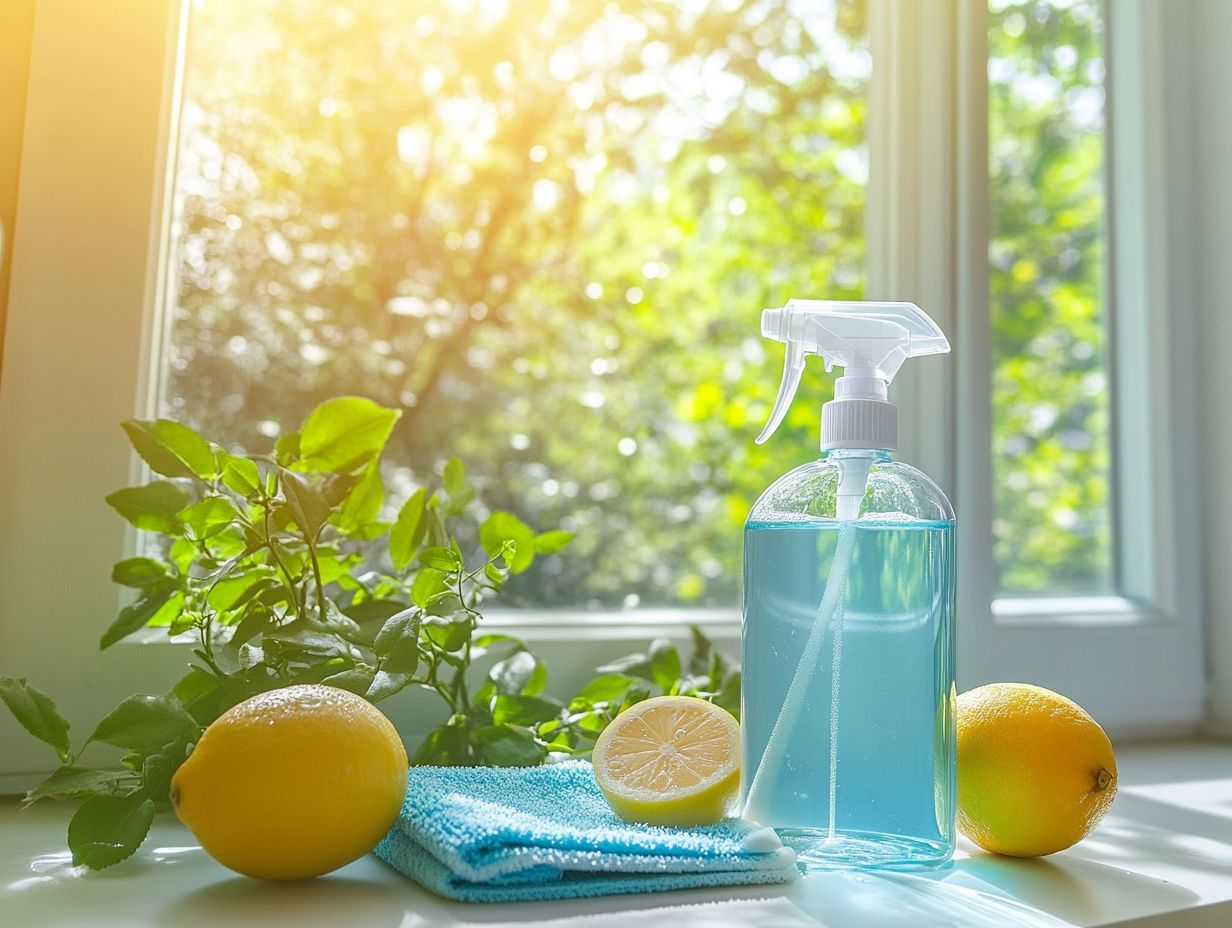
To ensure the safety of your children and pets, it s essential to store your homemade window cleaner out of their reach. Choose cleaning supplies with child-proof caps to keep your little ones safe!
While the ingredients may be safe, exercising caution is paramount to prevent any accidental ingestion or misuse of the cleaning solution. Along with thoughtful storage, consider using containers that are clearly labeled and constructed from materials that little hands or curious paws can t easily open.
Keeping the cleaner in a high cabinet or a locked pantry is advisable. These can effectively serve as a barrier, keeping these solutions safely out of reach.
Always remember to keep your cleaning supplies away from food items and frequently accessed areas to further minimize risks. By implementing these safety practices, you can fully enjoy the advantages of natural cleaning methods while ensuring a secure environment for your loved ones.
3. Test on a Small Area First
Before you apply your homemade window cleaner to a large or prominent surface, it s wise to test it first on a small, inconspicuous area. This is especially important for delicate materials like fabrics and wood finishes.
This precaution helps ensure that your cleaning solution won t cause any unwanted reactions or damage, providing you with the peace of mind you deserve when using your DIY cleaner.
For example, if you re tackling wood finishes, consider trying it out on the underside of a piece of furniture or in a corner that won t be easily noticed. The same goes for glass surfaces, painted walls, or delicate materials like fabrics, which can sometimes react unpredictably to certain ingredients.
To evaluate the results of your patch test a small test on a hidden area to check for any adverse reactions take a moment to observe any discoloration, streaks, or peeling after a few minutes. If you encounter any of these issues, consider adjusting your glass cleaner recipe or using another cleaning solution.
If you notice any adverse changes, you can swiftly adjust your cleaning formula or opt for a different surface type to ensure a successful clean.
Effective Tips for Using Homemade Cleaners
To achieve optimal results with your homemade window cleaner, employing specific tips and techniques can significantly enhance the effectiveness of your cleaning solution. Here are some window cleaning tips to help you make the most out of your homemade cleaner.
Utilizing a microfiber cloth is crucial for ensuring streak-free results, as it effectively traps dirt and grime without leaving any lint behind. Understanding when to clean and how to apply the solution can make all the difference in maintaining those sparkling clean surfaces you desire.
Now that you know these safety tips, it s time to clean smart and safe!
1. Essential Cleaning Tools: Using a Microfiber Cloth
Using a microfiber cloth is one of the best practices when it comes to cleaning glass surfaces with your homemade window cleaner. These cleaning tools ensure that you get streak-free results every time. Microfiber is a type of material made from tiny fibers that trap dirt effectively, minimizing the risk of scratches.
The unique fibers in microfiber cloths are designed to trap dirt and dust effectively, making them perfect for achieving that polished finish on your windows, mirrors, and glass tables.
Unlike traditional cleaning cloths, microfiber options offer an unparalleled level of cleanliness, leaving surfaces immaculate without the visible streaks or lint that often come with cotton or synthetic versions.
These cloths are an environmentally friendly choice as they can be reused multiple times. Their great ability to soak up water ensures quick drying, which is especially beneficial for maintaining clarity on glass surfaces.
To extend the lifespan of your microfiber cloths, it s crucial to wash them separately in warm water and steer clear of fabric softeners, as these can clog the fibers and reduce their effectiveness. Air drying is the way to go; it helps preserve their structure, ensuring they remain reliable tools in your cleaning arsenal.
2. Effective Techniques: Wipe in a Circular Motion
When applying your homemade window cleaner, using a circular motion can significantly enhance your cleaning process, allowing you to lift dirt and grime with impressive efficiency. This technique is a key part of window cleaning tips that professionals often recommend.
This approach not only maximizes contact with the glass but also reduces the chances of leaving behind visible streaks, ensuring a beautifully polished finish. Maintaining consistent pressure throughout this circular motion is essential, as it results in even application of the cleaner.
This method is particularly effective at dislodging stubborn residues that may cling to the surface, contributing further to that spotless shine you desire.
To optimize your results, consider overlapping slightly with each circular pass to ensure complete coverage of the glass surfaces. Using a microfiber cloth or newspaper also boosts your technique, as these materials excel at absorbing moisture and preventing lint from lingering behind. Don’t forget to use proper cleaning tools and household items like a squeegee for a streak-free finish.
3. Avoid Direct Sunlight
When you re cleaning windows with a homemade cleaning solution, it s wise to steer clear of direct sunlight. The harsh rays can cause your cleaner to dry far too quickly, resulting in those pesky streaks you re trying to avoid.
Opting for early morning or late afternoon gives your solution the time it needs to work its magic before it evaporates, leading to a much cleaner finish. For best results, a DIY glass cleaner made from distilled water, vinegar, and essential oils can be a safe alternative to commercial products.
Cleaning windows during these times, when the sun sits lower in the sky, also helps minimize glare, making it easier for you to spot any missed spots or streaks. Plus, the cooler temperatures mean the glass isn t excessively hot, which can enhance your cleaning efforts.
To elevate your window cleaning experience, consider timing your session according to the weather forecast. Overcast days can create the perfect conditions for an impeccable clean. This thoughtful approach not only boosts the effectiveness of your cleaner but also saves you effort.
Get ready to see your windows sparkle like never before!
Can You Add Scent to the Homemade Window Cleaner?
Absolutely! You can elevate your homemade window cleaner by adding essential oils. This not only enhances the fragrance but also offers additional cleaning benefits.
Consider popular options like lemon, lavender, or eucalyptus essential oils. They transform your cleaning routine into a refreshing experience.
These oils provide delightful scents that evoke feelings of freshness and tranquility. This makes window cleaning feel less like a chore and more like a mini spa session.
For instance, lemon essential oil is famous for its degreasing power. Lavender sets a calming atmosphere that might just make you look forward to your next polishing session.
A homemade window cleaner with essential oils provides a safe alternative to traditional cleaners, ensuring safety for kids and pets.
To incorporate these oils, add a few drops to your base cleaner solution. This is typically a blend of distilled water purified water that is free from impurities and vinegar or a mild soap.
Remember, the potency of essential oils is no joke; a little goes a long way. Starting with small amounts will help you avoid overwhelming scents and any potential skin irritations during your cleaning escapades.
What Are Some Other Natural Cleaning Solutions?
Along with crafting your own window cleaners, discover an array of natural cleaning solutions that can tackle various household tasks with ease. Homemade cleaning products can be made from ingredients you probably already have at home. Try out these exciting combinations!
- distilled white vinegar and baking soda,
- lemon juice and olive oil, or
- hydrogen peroxide and water.
These mixtures pack a powerful punch! They not only boast impressive cleaning power but also prioritize safety for both the environment and your loved ones.
1. Baking Soda and Vinegar
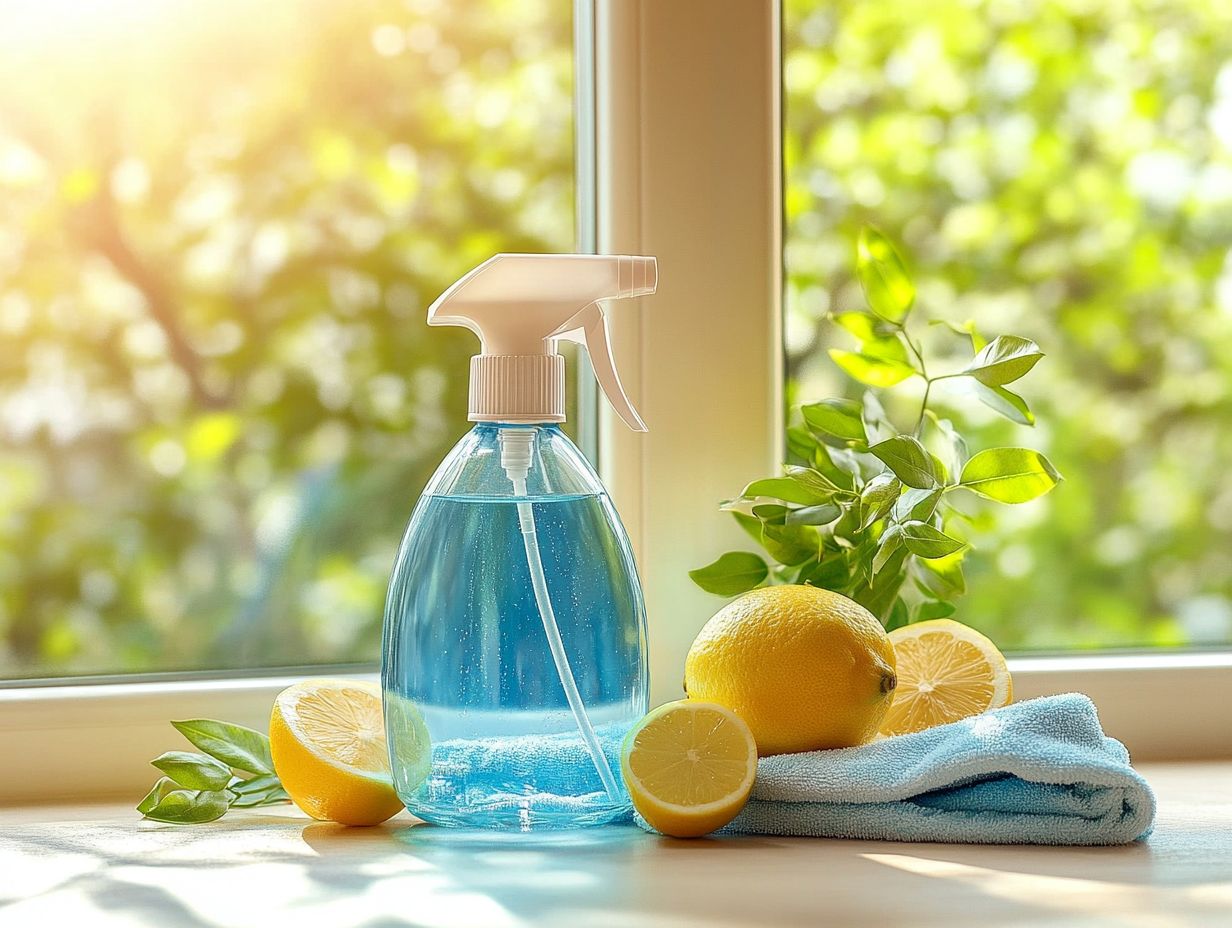
The combination of baking soda and vinegar forms a powerful natural cleaning solution that can effectively tackle tough stains and odors throughout your home. When you mix these ingredients, they create a fizzy reaction that loosens grime and debris, making it an excellent choice for a variety of cleaning tasks.
This homemade cleaner is both effective and environmentally friendly. In your kitchen, this dynamic duo works wonders on countertops, effortlessly removing stubborn food residues. In the bathroom, it shines by eliminating soap scum and hard water stains from sinks and tubs with ease.
For window cleaning, a mix of vinegar and water can provide excellent results. To maximize efficiency, always apply the baking soda first, then follow up with the vinegar to activate that delightful bubbly action.
After you ve done the cleaning, make sure to rinse the surfaces thoroughly to eliminate any lingering vinegar smell. This method is endorsed by cleaning experts like Berit Thorkelson and CJ Younger.
For best results, store these ingredients in separate containers. Their combined form should only be created fresh for immediate use, ensuring that the solution s potency remains intact for optimal cleaning results. This is a standard recommendation in Better Homes & Gardens for homemade cleaning products.
2. Lemon Juice and Olive Oil
Lemon juice and olive oil create a remarkable natural cleaning solution. It excels at polishing wood surfaces and cutting through grease.
The acidity of lemon juice breaks down grime. Meanwhile, olive oil adds a nourishing finish, making it a favorite among those who prefer natural cleaning.
To whip up this effective cleaner, mix equal parts of freshly squeezed lemon juice and high-quality olive oil in a spray bottle or bowl. Shake or stir the mixture thoroughly to blend the ingredients completely.
When you apply the solution, use a soft cloth or microfiber towel. Gently rub it into the wood surface, following the grain for a perfect finish.
This method not only banishes dirt but also leaves behind a natural shine. It s great for kitchen surfaces, cutting boards, and even stainless steel appliances.
This mixture is ideal for eco-conscious households as it works as a fantastic all-purpose cleaner for every room.
With its natural properties, this solution cleans effectively while helping you avoid harsh chemicals found in many commercial products.
3. Hydrogen Peroxide and Water
A mixture of hydrogen peroxide and water is an excellent natural cleaning solution that should find a place in your household arsenal. This powerful blend disinfects surfaces and tackles stubborn stains.
It proves essential for maintaining a clean and healthy home. Green cleaning experts like Jessica Bennett and Emily Estep recommend this combination for its effectiveness and safety.
When diluted correctly, it can be applied to various surfaces, from countertops to bathroom tiles and cutting boards. This ensures you create a hygienic environment.
For instance, using this solution on a cutting board can help eliminate lingering odors from raw meats. Treating bathroom surfaces can significantly reduce the risk of mold growth.
Keep in mind that hydrogen peroxide can bleach certain materials. So, it s wise to test it on a small, inconspicuous area first.
Wearing gloves during application is a smart choice to protect your skin from irritation. Make sure to maintain proper ventilation in your cleaning spaces to avoid inhaling any fumes.
Following these window cleaning tips will ensure you achieve the best results without compromising safety.
Frequently Asked Questions
What ingredients do I need to make a safe homemade window cleaner?
To make a safe homemade window cleaner, you will need white vinegar, water, rubbing alcohol, and a few drops of essential oil for fragrance (optional).
Can I use any type of vinegar for my homemade window cleaner?
Yes, you can use any type of vinegar, but white vinegar is the most commonly used for cleaning purposes.
How do I mix the ingredients for my homemade window cleaner recipe?
Mix 1 cup of water, 1 cup of white vinegar, and 1/4 cup of rubbing alcohol in a spray bottle. Add a few drops of essential oil if desired.
Is it safe to use essential oils in my homemade window cleaner?
Yes, essential oils are safe to use in your homemade window cleaner as long as they are diluted properly and you are not allergic to them.
Can I use my homemade window cleaner on all types of windows?
Yes, you can use your homemade window cleaner on all types of windows, including glass, plexiglass, and tinted windows. However, always spot test first to ensure no damage or streaking occurs.
How long does my homemade window cleaner last?
Your homemade window cleaner can last for several months if stored in a cool, dark place. However, it is best to make small batches and use them within a few weeks for optimal effectiveness.

